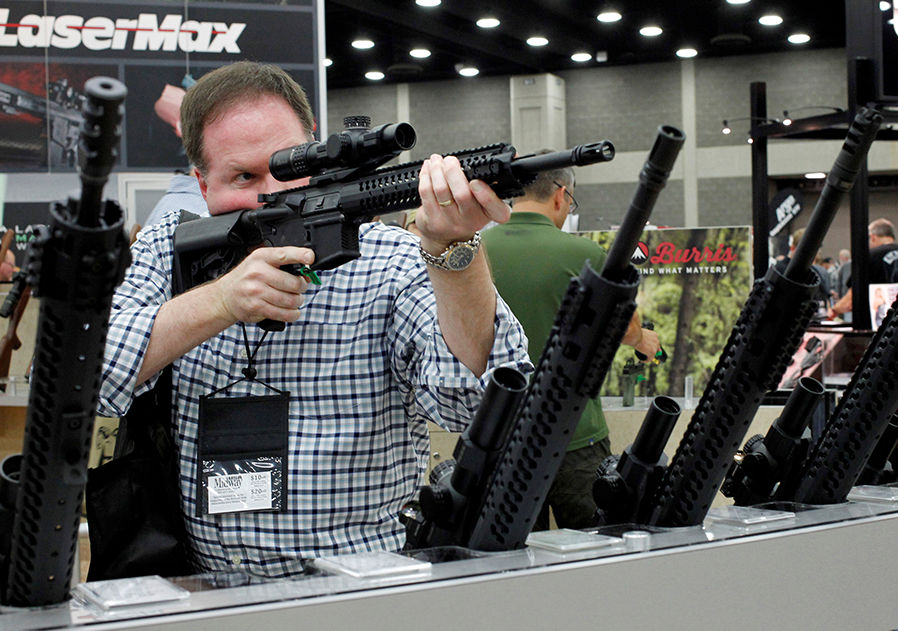As the son of a retired police officer, and someone who spent his childhood around all manner of firearms, I have no beef with guns.
I grew up in a house with a Winchester above the fireplace, a shotgun in the closet and my dad’s service revolver tucked into one of the drawers of his bedroom dresser. That house was on a farm town in Central California, so I also grew up around pickup trucks with gun racks and ponds where elementary school boys would shoot frogs with BB guns.
I’m perfectly at ease around these pieces of hardware. I’m not the least bit fascinated by them, and they hold no special mystique for me. But I’m comfortable with guns.
What I’m uncomfortable with is the modern gun debate. So many parts of it give me the creeps. And every time it flares up — which is what usually occurs after a terrible act of violence with a high body count — I find myself wondering what happened to our humanity. Do we really have more regard for these inanimate pieces of metal than we do our fellow human beings?
What I’m uncomfortable with are the extremists at both ends of the debate — the gun nuts and the confiscation brigade. As is usually the case with extremists in any heated political debate, they’re not interested in listening to opposing views, are eager to ascribe sinister motives to anyone who disagrees with them and not willing to give an inch, even if it means reaching a solution.
What I’m uncomfortable with is that the gun nuts are quick to go on the defensive whenever anyone brings up any proposed reform that might make us safer or dares to ask simple questions. Like why, for instance, in the case of Las Vegas shooter Stephen Paddock, who killed 58 people and injured 500 others, an individual would spend thousands of dollars to purchase nearly 50 high-powered weapons — including 33 in one year? And why were law enforcement and the federal government the last to find out about this stockpile?
What I’m uncomfortable with is that the confiscation brigade is so quick to trivialize the right that we all have to protect ourselves and our families from harm, and the fact that many Americans count on their easy access to firearms to allow them to carry out that responsibility. It’s true that, when the country was created, the people who founded it were most concerned with maintaining a militia. But, in modern times, the reason that most people keep and bear arms is self-defense. That is a fact of life that needs to be respected.
What I’m uncomfortable with is my sense that many Americans are, these days, more devoted to the Second Amendment than to the First Commandment. We think more about our rights under government than our responsibilities to our fellow man, more about what we are permitted to do under the law (“the right to bear arms”) and less about what we are prohibited from doing by God (“Thou shalt not kill”). We have most certainly lost our way, and it will not be easy to find our way home.
Finally, what I’m uncomfortable with is the fact that the time-honored American love affair with guns has, in the last few decades, become seriously deformed and morphed into a sick and dangerous obsession. Perhaps we started on this downward slide in 1981, when President Reagan was shot by lone gunman John Hinckley Jr. But since then, we’ve only picked up steam.
As one indicator of our descent, just look at how gun shows in the U.S. have changed over the decades. Forty years ago, when I was 10 years old and living in the rich farmland of Central California, my father would take me to the annual gun show held in the exhibit halls at the local fairgrounds. There, surrounded by collectors and other gun enthusiasts, I’d pore over Winchesters and Colts with a mixture of awe and fascination. These were guns that had riveting stories to tell.
Recently, I had the chance to take my own 10-year-old son to a gun show where we live in Southern California, and it was a much more unsettling experience. People waited in line for hours to buy semiautomatic weapons and thousands of rounds of high-powered ammunition; they were stocking up. They seemed to be afraid that the government was going to swoop in and try to take their guns away. And they weren’t about to let that happen.
Here’s the real question: What have we allowed to happen to our country, our culture and our character that we should find ourselves at this spot — wandering in the wilderness of the gun debate, searching for compromise and common ground, while battling evil and surrounded by monsters?
That reality should make us all uncomfortable.
Ruben Navarrette is a syndicated columnist with The Washington Post Writers Group, a member of the USA Today Board of Contributors, a columnist for the Daily Beast, author of “A Darker Shade of Crimson: Odyssey of a Harvard Chicano” and host of the podcast “Navarrette Nation.”

